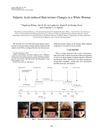 February 2024 in “International Journal of Molecular Sciences”
February 2024 in “International Journal of Molecular Sciences” Hair loss in Androgenetic Alopecia is caused by genetics, aging, and lifestyle, leading to hair follicle shrinkage and related health risks.

Hair loss in women in Lagos, Nigeria is not common, but when it happens, it's usually severe.
 1 citations,
July 2024 in “Skin Research and Technology”
1 citations,
July 2024 in “Skin Research and Technology” Patients with androgenetic alopecia have thinner subcutaneous fat layers in their frontal scalp compared to healthy individuals.
 December 2024 in “Nutrients”
December 2024 in “Nutrients” Skin, hair, and nail changes can help detect eating disorders early.
September 2015 in “Pediatrics in review” The 7-month-old boy has a persistent rash that doesn't improve with typical skin treatments.
 4 citations,
January 2016 in “Postepy Dermatologii I Alergologii”
4 citations,
January 2016 in “Postepy Dermatologii I Alergologii” Many hair diseases, including those caused by medications and psychological issues, can lead to hair loss and require proper treatment and specialist care.
 September 2019 in “Journal of Investigative Dermatology”
September 2019 in “Journal of Investigative Dermatology” Sandalore, a synthetic scent, was found to reduce hair loss and improve hair growth in women with hair shedding issues.
 May 2021 in “Our Dermatology Online”
May 2021 in “Our Dermatology Online” A woman with a rare scalp condition causing a thick scalp and hair loss didn't improve with steroid treatment.
 July 2024 in “Journal of Investigative Dermatology”
July 2024 in “Journal of Investigative Dermatology” Ashwagandha nanoparticles help hair grow by increasing a growth factor.
 March 2021 in “CRC Press eBooks”
March 2021 in “CRC Press eBooks” The document concludes that different patterns of hair thickness and scalp changes can help diagnose types of non-scarring hair loss.
 13 citations,
January 2007 in “Epilepsia”
13 citations,
January 2007 in “Epilepsia” Valproic acid can cause reversible hair curling and persistent hair thinning.
1 citations,
July 2006 in “American Journal of Psychiatry” Lamotrigine can cause hair loss.
 April 2024 in “Remedium Journal about the Russian market of medicines and medical equipment”
April 2024 in “Remedium Journal about the Russian market of medicines and medical equipment” Pharmacy workers need more education to better help people with hair loss.
 1 citations,
August 2021 in “International journal of cosmetic science (Print)”
1 citations,
August 2021 in “International journal of cosmetic science (Print)” Using piroctone olamine on the scalp helps reduce hair loss and improves scalp health.
June 2016 in “Annals of the Rheumatic Diseases” Long-term glucocorticoid use can cause skin problems like easy bruising and poor wound healing, especially at higher doses.
 December 2024 in “Brazilian Journal of Health Review”
December 2024 in “Brazilian Journal of Health Review” Early diagnosis of alopecia frontal fibrosante is crucial, but treatment remains controversial and varies.
 May 2020 in “Hair transplant forum international”
May 2020 in “Hair transplant forum international” Most Indian men aged 50-55 have a safe area for hair transplants, but selection should be careful to avoid overharvesting.
 January 2025 in “International Journal of Scientific Research”
January 2025 in “International Journal of Scientific Research” 12.5% of women with PCOS experience moderate hair loss, highlighting the need for early detection and management.
 4 citations,
February 2020 in “Journal of Cosmetic Dermatology”
4 citations,
February 2020 in “Journal of Cosmetic Dermatology” Trichoscopy helps diagnose hairline recession causes in Egyptian women, with androgenetic alopecia being the most common.
 4 citations,
April 2016 in “Experimental Dermatology”
4 citations,
April 2016 in “Experimental Dermatology” AGA causes hair loss through follicle miniaturization and hair cycle changes; regrowth depends on anagen initiation in kenogen follicles.
 1 citations,
June 2015 in “Australasian Journal of Dermatology”
1 citations,
June 2015 in “Australasian Journal of Dermatology” A patient with Cronkhite-Canada syndrome improved with nutritional support and steroids, but early diagnosis is key due to high mortality.
1 citations,
December 2017 in “Annals of Dermatological Research” Accurate early diagnosis of Lichen Planopilaris is crucial to prevent permanent hair loss.
 7 citations,
May 1978 in “International Journal of Dermatology”
7 citations,
May 1978 in “International Journal of Dermatology” Recent hair loss research shows some progress, especially in understanding male pattern baldness, but effective treatments for many types of hair loss are still lacking.
5 citations,
October 2003 in “Archives of Dermatology” The elderly woman experienced hair loss and scalp itching, especially at the front hairline, and lost her eyebrows.
 6 citations,
January 2015 in “Journal of The European Academy of Dermatology and Venereology”
6 citations,
January 2015 in “Journal of The European Academy of Dermatology and Venereology” Different hair loss types need accurate diagnosis for proper treatment.
 July 2022 in “Hair transplant forum international”
July 2022 in “Hair transplant forum international” Vitamin D might be involved in hair growth, so taking supplements could help treat hair loss if you're deficient.
 6 citations,
March 2019 in “The American Journal of Dermatopathology”
6 citations,
March 2019 in “The American Journal of Dermatopathology” Amyloid deposits linked to a type of protein may cause a unique pattern of hair loss by disrupting hair growth cycles.
 31 citations,
April 2019 in “Journal of Cutaneous Pathology”
31 citations,
April 2019 in “Journal of Cutaneous Pathology” Hair becomes gray and thin as we age, and while most hair loss in older people is due to genetics, there's a chance for gray hair to regain color under certain conditions.
 9 citations,
March 2022 in “Frontiers in Immunology”
9 citations,
March 2022 in “Frontiers in Immunology” Foxp3+ Regulatory T Cells are important for immunity and tolerance, affect hair growth and wound healing, and their dysfunction can contribute to obesity-related diseases and other health issues.
 1 citations,
September 2016 in “Hair transplant forum international”
1 citations,
September 2016 in “Hair transplant forum international” Dr. Muhammad Ahmad created a simpler system to better describe male pattern hair loss.

























